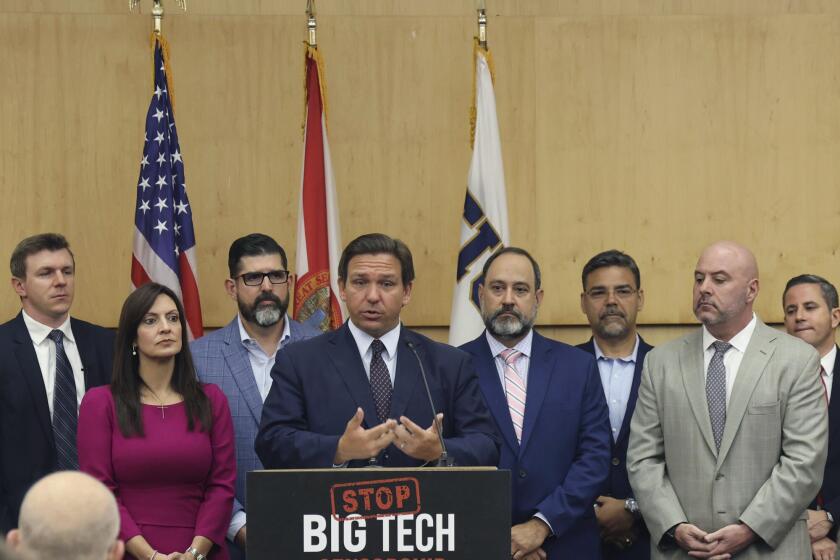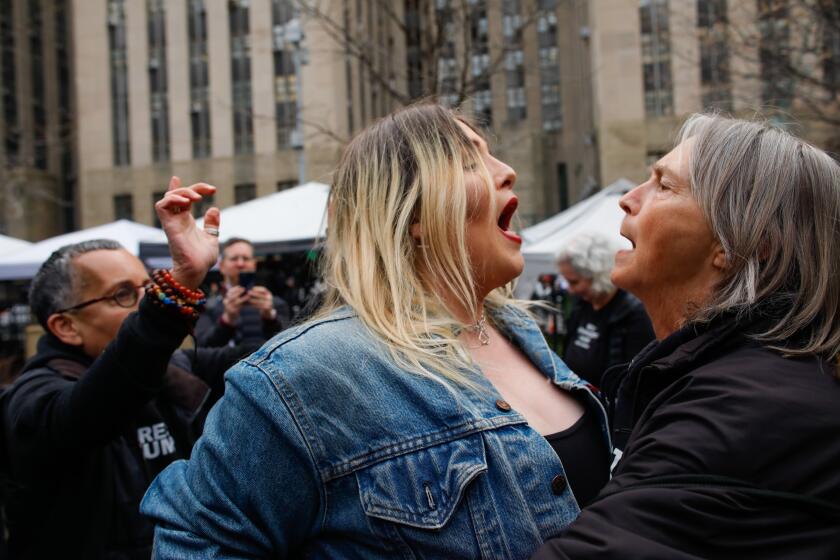Editorial: Supreme Court should affirm that government complaints are not free speech violations

- Share via
Do government officials violate the 1st Amendment when they press internet platforms to remove or restrict misinformation about COVID-19, alleged election fraud or other matters of public interest? That proposition was presented to the Supreme Court on Monday, and many justices seemed appropriately skeptical.
In one of several internet-related cases considered by the court this term, a lawyer for Louisiana and Missouri and some individuals defended an injunction saying that federal officials, including White House staffers, the surgeon general and FBI employees, may not “coerce or significantly encourage” social media companies to remove material.
Opinion: How the Supreme Court should rule on Texas and Florida laws against social media moderation
The cases, NetChoice vs. Paxton and Moody vs. NetChoice, concern Florida and Texas laws prohibiting moderation by platforms such as Facebook and YouTube.
It would be a violation of the 1st Amendment if the government coerced internet platforms to moderate content, for example by threatening retaliation if the platforms didn’t take the government’s advice. That was essentially the contention in another case argued Monday involving a New York state official’s effort to dissuade banks and insurance companies from furnishing services to the National Rifle Assn.
In upholding (though narrowing) an injunction issued by a federal district judge in the Louisiana and Missouri social media case, the U.S. 5th Circuit Court of Appeals adopted a somewhat different approach. But that approach, if accepted by the Supreme Court, would prevent the government from suggesting that some material be taken down or limited in its dissemination because of concerns about public health or national security.
Can making nice with our political opposites change the underlying dynamic driving polarization? Not while social media disinformation thrives unchecked.
The Supreme Court should resoundingly reject that approach and make it clear that the government violates free speech only when it uses its powers to coerce compliance. The court should also make it clear that “significant encouragement,” a phrase used in a 1982 decision, is not the controlling legal standard. (The court could also find that the two states lack standing to sue, but a ruling on the merits would be preferable.)
As Justice Brett M. Kavanaugh, a veteran of the executive branch, suggested at oral arguments, such limitations on the government would forbid administrations from something they have done regularly even before the rise of the internet: expressing displeasure about particular stories to news outlets. Kavanaugh said: “It’s probably not uncommon for government officials to protest an upcoming story on surveillance or detention policy and say, you know, if you run that, it’s going to harm the war effort and put Americans at, you know, risk.”
This lawsuit must be viewed in the context of a relentless campaign by conservatives to accuse the government and social media companies of censoring conservative content online. It also comes before the court during a presidential election year, in which voters likely will be inundated with conspiracy theories such as Donald Trump’s claim that the 2020 election was “rigged.”
A ruling against Louisiana and Missouri would make it clear that government officials may propose to social media companies that they remove or restrict certain information, so long as there is no coercion. Of course, officials should be prudent about when and how they flag what they consider to be misinformation. For example, it would be wise for White House officials to refrain from making suggestions to social media platforms about statements coming from the Trump campaign; let the Biden reelection campaign register such complaints.
But government officials must be free to suggest to social media companies that some content is false or dangerous. That is how the court should rule.
More to Read
A cure for the common opinion
Get thought-provoking perspectives with our weekly newsletter.
You may occasionally receive promotional content from the Los Angeles Times.












